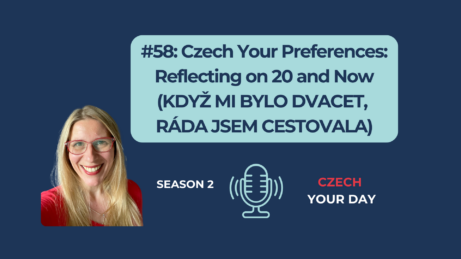Episode 27 (daily podcast CZECH YOUR DAY) transcript included

THIS WEEK’S TOPIC: DAYS OF THE WEEK + PARTS OF THE DAY
THE TRANSCRIPT/HANDOUT IS DOWN BELOW
Using Prepositions with Days
How do the days of the week change when you add the preposition V/VE in Czech? What should you be aware of? How to sound more like a native (and say it with much more ease)? This is what today’s episode is about.
- V pondělí (on Monday)
- V úterý (on Tuesday)
- Ve středu (on Wednesday)
- Ve čtvrtek (on Thursday)
- V pátek (on Friday)
- V sobotu (on Saturday)
- V neděli (on Sunday)
- O víkendu (at the weekend)
Noticing the Changes
Let’s celebrate — there are some days of the week where the endings don’t change:
- pondělí – v pondělí
- úterý – v úterý
- čtvrtek – ve čtvrtek
- pátek – v pátek
For these days, simply add the preposition „v/ve“ and you’re set.
The Trickier Days
But watch out! Some days do change:
- ve středu (on Wednesday)
- v sobotu (on Saturday)
- v neděli (on Sunday)
The Secret of ‚F‘ Sound
Check it out if you really speak like Czechs: when saying the days of the week, we often pronounce the letter ‚V‘ as ‚F‘, which can simplify pronunciation:
- V pondělí (pronounced F pondělí)
- V úterý (F úterý)
- V pátek (F pátek)
- V sobotu (F sobotu)
Komentáře








